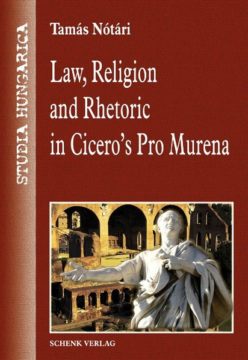Marcus Tullius Cicero delivered his speech in 63 B.C. in defence of Lucius Licinius Murena, who was charged with election fraud (ambitus). The condemnation of Murena would have broken not only the commander’s political career, it would have driven the Republic into serious danger. In his statement of defense, it is not primarily the
personal merits of the competitors, Licinius Murena and Sulpicius Rufus — one of the most outstanding jurists of Roman Republic — that Cicero compares, it is their career, the commander’s, the jurist’s activity that he puts on the scales of public good, and provides a fairly humorous, witty assessment of these.
The present book aims to explore the historical background of Pro Murena, and to analyse it in terms of law, religion and rhetoric. Examining Cicero’s speech one cannot strictly separate the legal and philological questions, as in Rome legal and sacral images constituted an organic unit. The analogies and consequences that can be drawn from these, may lead to a better understanding of the structure of specific institutions of law and religion (e.g., legis actio sacramento in rem, conventio in manum and interpretatio iuris) and the way these are embedded in antique thinking and imagination.
- Veröffentlicht am Dienstag 7. Oktober 2008 von Schenk Verlag
- ISBN: 9783939337430
- 160 Seiten
- Genre: Antike, Geschichte, Sachbücher, Vor- und Frühgeschichte
